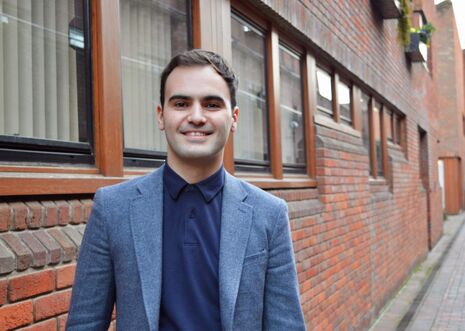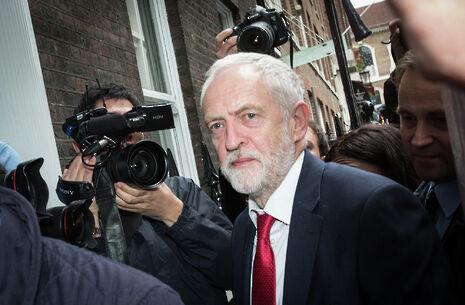Matt Zarb-Cousin: ‘the status quo is not working for most people’
Harry Robertson talks to Matt Zarb-Cousin, Corbyn’s former media man, about the election, social media tactics, and whether or not Corbyn supporters are “thick as pig shit”

The fact that Matt Zarb-Cousin applied for the job as Jeremy Corbyn’s official spokesperson after seeing the opening ridiculed on Have I Got News For You in 2016 tells you a lot, both about him and the early days of Corbyn’s leadership. Back then, no one was predicting that the Labour Party, who were about 13% behind the Tories the polls, would increase their vote share by more in 2017 than at any election since 1945.
Zarb-Cousin was in Cambridge last Friday to speak at the POLIS British politics seminar series at Robinson College, which occur weekly. He held the role of the Labour leader’s media spokesperson from June 2016 to April 2017, and maintains that he always believed Labour would do much better than expected. “I knew that our policies were very popular. If you looked at any polling before the election on individual policies, then the public overwhelmingly supported Labour’s programme. I think the issue was, before an election people don’t really pay much attention to politics, it doesn’t really register on their day to day goings on.”
“The Tory manifesto was just appalling, they had nothing to offer”
He highlights the importance of the election broadcast regulations, which ensure that broadcasters give fair and balanced coverage to parties and candidates in the period running up to an election. “Jeremy had an opportunity to speak with his own voice”, Zarb-Cousin says. “Every morning, every day, they had a new policy to announce, and it was invariably very popular.”
Having worked in an understaffed Labour team 16 hours a day, seven days a week, and been as close to the action in the 2017 general election as anyone else, bar the candidates, Zarb-Cousin is as knowledgeable as anyone about the campaign. Why, then, did an election trailed by the Conservatives as being all about Brexit, end up being about anything but?
“Most people think that we made our decision on Brexit in 2016, and that shouldn’t define a general election, which is about lots of issues. If both parties accept the result, there’s not really a debate to be had about it, and even if there was, it shouldn’t dominate the entire election campaign. You could see in their manifesto, the Tory manifesto was just appalling, they had nothing to offer.”
By contrast, he says, “the nature of Labour’s policy platform was: we’re going to tax these people to pay for this thing. It was an antagonism. The Conservatives had to therefore say we’re not going tax these people to not pay for this thing. By doing that, Labour set the agenda. The election campaign was defined by Labour’s policy in many ways, it was fought very much on their turf.”
“If your friend shares something you’re more likely to want to watch it”
But was the result not really more about young, university-educated liberals and Londoners coming together to give Labour a big boost at the polls, rather than their policies really persuading many voters in the party’s traditional working-class heartlands? Zarb-Cousin isn’t misty-eyed about the result: “Labour didn’t win the election, it was a hung parliament, there was a swing to them and they won seats, but they didn’t win the election.” But, he says, “they won seats in Scotland against what most people anticipated”. He points to constituencies such as Peterborough as places where the working class vote came back. “In Peterborough you had a situation where the Ukip candidate stepped down to support the Conservative, and then Labour won the seat.”
Labour’s remarkable achievement was largely down to their extremely effective campaigning, a vital part of which was social media. “More than any election, naturally I suppose, social media played a huge part. It’s not enough to do what the Conservatives did, which is to put millions of pounds behind sponsored posts which repeat the key messages. You’re taking an analogue communications strategy and applying it to a digital context.”
“The difference with Labour’s content, and particularly Momentum’s”, Zarb-Cousin says, “was that it was high quality, shareable. If your friend shares it you’re more likely to want to watch it.” It helps, he says, “to have a positive message and to have something to say, and the Tories lacked that. They lacked the nous that Labour had, Labour knew that you could actually reach a lot of people through organic sharing. I think a quarter of UK Facebook users saw a Momentum video in the course of the general election campaign. That’s astronomical.”
Why, then, was the Labour social media campaign so much better? “Primarily because young people are involved in the Corbyn project, and they get how to campaign in 2018, 2017. But it all comes down to the fact that the Tories haven’t really got anything positive to say.”

Zarb-Cousin uses Twitter himself in a way quite unlike most people in Westminster. An article from the newspaper the i says of him, “he has led the line for a group of hardcore Corbyn supporters with little time for civility”. Does he not think the way the left uses Twitter can be damaging to their cause? “No, look, I don't think it’s damaging at all.”
“There was a lack of intellectual curiosity or attempt to try and understand why this is happening, or why this appeals to people”
What about the instances of left wing mobs being sexist or anti-Semitic online? “That’s unacceptable […] people who are abusive in that respect should be thrown out of the party, there’s no two ways about it.” But on the broader topic he defends the left. “We were denigrated and ridiculed and delegitimised consistently for months and months,” he says, “I think that we give as good as we get. I think that it’s important that the left doesn’t go into its shell.”
On that topic, I wonder whether he feels vindicated by the surge in popularity for leftist policies, given the condescension and ridicule those to the left of left-of-centre have faced for many years. A particular incident I mention was when Financial Times reporter Janan Ganesh called Corbyn supporters “thick as pig shit”.
“The problem with the Corbyn project from the beginning was that it lacked any legitimacy from the perspective of the commentariat. They were out to delegitimise it from the outset. I don’t mind criticism, that’s healthy, I’m not saying no one should be critical of any politicians or movements, but it was a lack of intellectual curiosity or attempt to try and understand why this is happening, or why this appeals to people.”
“What’s happening around the world – Trump, Brexit – populist movements are growing, in Italy now there’s a kind of parallel Momentum organisation – this is happening everywhere because the system, the status quo, is not working for most people, they’re looking for an alternative.”
Attacks on Corbyn, however, have not really abated since the election, especially in some quarters of the press. A recent Sunday Express front page called him “Jeremy Carbon”, accusing him of great hypocrisy for being driven by a security detail in a diesel car. “It just shows how irrelevant and marginalised the tabloid press is becoming”, Zarb-Cousin says.
“There was a report out that day when they did the story on the Czech spy. The IFS said that home ownership among 25 to 34 year-olds has more than halved in 20 years. Even in the highest quartile of earners, the richest people in that demographic, only 60% of them own a home. And you think, that is a massive problem for the country. If this generation doesn’t have a stake in the system or a stake in society, they’re the big problems the country’s facing, and that’s what’s relevant to people’s lives right now.”
Given his insights into running a strong campaign and his experience at the forefront of Labour politics, I ask whether the rumours are true that Zarb-Cousin is looking for a seat in the Commons. He’s quick to shut me down: “No, wrong.” Never in the future? “OK, I wouldn’t rule it out in the future. OK, put this. I’m not looking for selection any time soon.”
 News / Eight Cambridge researchers awarded €17m in ERC research grants27 December 2025
News / Eight Cambridge researchers awarded €17m in ERC research grants27 December 2025 News / Clare Hall spent over £500k opposing busway 24 December 2025
News / Clare Hall spent over £500k opposing busway 24 December 2025 Comment / League tables do more harm than good26 December 2025
Comment / League tables do more harm than good26 December 2025 Comment / The ‘class’ of Cambridge24 December 2025
Comment / The ‘class’ of Cambridge24 December 2025 News / Caius mourns its tree-mendous loss23 December 2025
News / Caius mourns its tree-mendous loss23 December 2025









